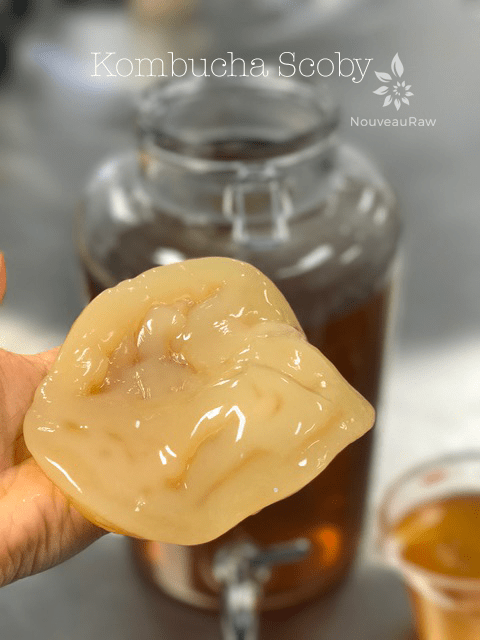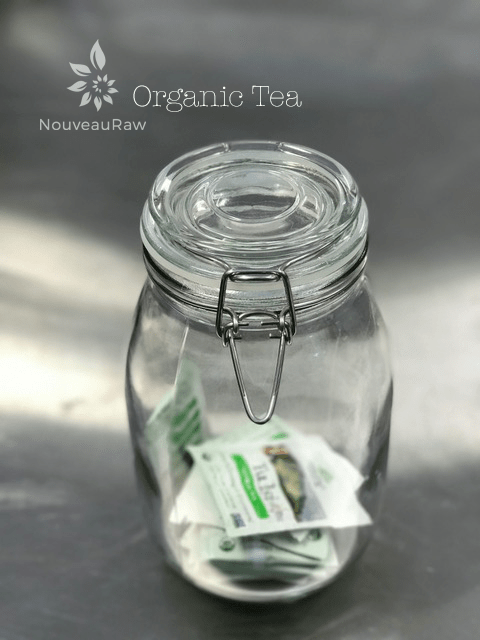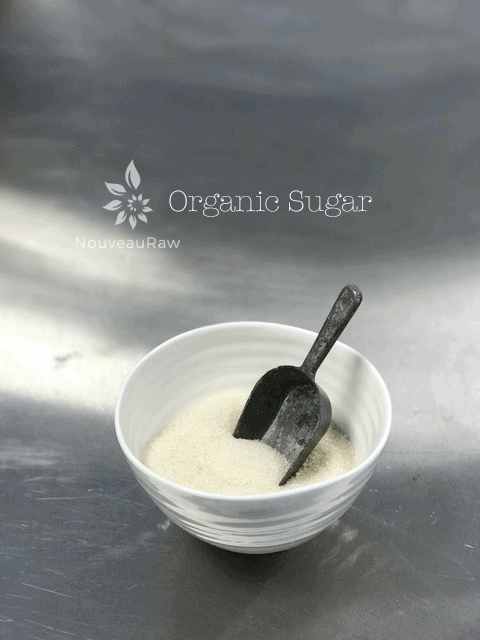#2 – Kombucha – Ingredients Needed

 Add to favorites
Add to favorites
Just like I share in all my other recipes, the quality of kombucha begins with the quality of your ingredients. Don’t forget this first rule of food preparation, or think of it as a place to skimp. Bob and I would much rather wear second-hand clothing so that we can eat better. This was something we talked about early on in our relationship.
 You might be able to identify with me here, but, I put off making my own kombucha for years because I was so intimidated by the process and quite frankly, the ingredients. Deliberately using caffeine and white sugar cane sugar? The very things that I had spent years coming off of, avoiding, and shooing away if it ever approached our front door!
You might be able to identify with me here, but, I put off making my own kombucha for years because I was so intimidated by the process and quite frankly, the ingredients. Deliberately using caffeine and white sugar cane sugar? The very things that I had spent years coming off of, avoiding, and shooing away if it ever approached our front door!
Finally, I slipped on my big girl apron and tightened the strings with a fierce determination of overcoming a culinary fear. Yep, even I have them from time to time. It was like reverting to the days when spices made me weak in the knees whenever I slid open the spice drawer. I conquered that, so why can’t I conquer this?! I can, I will, and I did.
I dove in head first and started off by learning how to do the continuous brew system. I have been doing this for over a year now, and the process is now second nature. So, do you have your big girl/boy apron on? Well tighten those strings and get ready. Remember, I am always with you throughout the process.
Let’s Start with the Basics
The essential ingredients needed to make kombucha are a SCOBY, tea, sugar, water, and a starter liquid. Flavoring can come into play later on if you desire. Read more about that (here). But let’s not jump ahead of ourselves. Let’s give our kombucha a solid, successful, and nutritious foundation.
SCOBY:
Why do I need a SCOBY?
- Without it, you won’t have kombucha.
- What is a SCOBY? Short answer; a Symbiotic Culture Of Bacteria and Yeast, it is the mothership to millions of microorganisms. Learn more by clicking (here).
 Tea:
Tea:
Why tea?
- Tea contains several nutrients and compounds such as nitrogen, caffeine, and theanine which feed the Kombucha culture.
- Once the kombucha process has started, the yeast and healthy bacterias help the polyphenols and anti-oxidants become more bio-available, which just means they are easier for your body to absorb.
What type of tea?
- Tea is tea, right? Not exactly. After studying the experts in this field, I have learned that the best teas to use are green, black oolong, white, and pu-erh teas.
- You can switch or even combine the teas you use, but it’s best to wait until you have a matured SCOBY before changing things up. Make at least four batches of kombucha before using some other teas.
- For more ideas on what types of teas to use, click (here).
Is there a wrong type of tea to use?
- Some herbal teas have oils in them which could harm the culture and retard the production of healthy bacteria. This can weaken the process making it difficult for the brew to ward off invaders such as mold.
- Teas with tisanes can weaken the bacteria population or become too weak to grow a new culture.
- If you wish to experiment with other teas, this is a good time to use a new SCOBY that has been hanging out in a SCOBY HOTEL. I wouldn’t risk using your main SCOBY for fear of something going haywire, but that’s just me.
- Do not use decaffeinated tea. Caffeine is considered a nutrient for the kombucha cultures, providing nitrogen so it can build new cells, as well as energizing the yeast and bacteria… these stimulate the fermentation process.
What about caffeine?
- If you are sensitive or flat-out wish not to consume much caffeine, you should know that the amount of caffeine left in the kombucha once it is done brewing, is considerably less than the tea had, but will still have some. This will vary based on your brewing methods and environment.
- To further decrease the caffeine content, brew the kombucha longer.
- Decaffeinated tea is frowned upon because the process in decaffeinating tea is done with chemicals. You are welcome to experiment, but if you notice that your SCOBY looks to be in poor health or new ones are not fully forming, it might be due to the decaffeinated tea.
 Sugar:
Sugar:
Why sugar?
- The bottom line is without sugar, you won’t have kombucha. The yeast and bacteria need it as food.
- Thinking that you can reduce the amount of sugar used can lead to a weak brew.
What type of sugar?
- When it comes to sweetening the tea, I use organic evaporated cane juice sugar. Never thought that I would have that back in the house again. :) Before I understood anything about kombucha, I was always turned off by the use of such sugar, so never made it or drank it. The thing to remember is that the sugar isn’t for YOU, it’s for the bacteria and yeast who eat up.
- Feel free to try the following or even make a mixture of the; Sucanat, demerara, turbinado, and brown sugar. Make sure they are not derived from GMO sugar beets.
- PURE Maple sugar can also be used. You will only need 1/2 cup of maple sugar instead of 1 cup of sugar.
Is there a wrong type of sugar to use?
- I don’t recommend the use of raw honey as it is anti-microbial and will start to kill off the microorganisms your SCOBY is made of. If you want to use honey make sure it is pasteurized. Never thought I would say that!
- If using white table sugar, make sure that isn’t derived from GMO sugar beets.
- Coconut sugar is a hit and miss. If you feel inclined to experience, please go for it. Log your results.
- Stevia – Stevia is a plant sugar and will not ferment.
- Xylitol is “non-fermentable.”
- Lactose – Kombucha is not lacto-fermentable.
- High Fructose Corn Syrup -let’s not even go there.
- Artificial Sweeteners
How much sugar will be in my drink?
- The key to reducing the amount of sugar that is left in the jar of kombucha that you drink is by allowing the kombucha to ferment for the proper amount of time. The longer you leave your kombucha to ferment the more tart it’ll get, and the less sugar there will be for you.
- During the fermentation process, there is a biological breakdown taking place in the sugars. They are broken down from sucrose and turned into fructose and glucose which have a lower glycemic impact on the body. The bacteria then gets busy to work on converting that to healthy gluconic and glucuronic acids. These break down the sugar further yet. So even though there is sugar left in the kombucha, it is a different type by the time the yeast and bacteria have had their way with it.
- Studies have been done that show how sugar decreases based on the fermenting time frame:
- During 7-14 days, it can reduce up to 50-70%
- During 15-30+ days, it can reduce up to 80%
Water:
What type of water?
- It is recommended to use filtered, distilled, or spring water.
- Know your water source and what is in it. Personally, use my tap water which is fresh water piped in from Mt. Hood, and haven’t experienced any issues.
Is there a wrong type of water to use?
- Water that is high in minerals, chlorine, fluoride, and other additives, can affect your kombucha (or any other fermentations).
Starter liquid:
What is a starter liquid?
- Also known as starter tea. This comes from the last batch of kombucha or store-bought kombucha (unpasteurized, neutral-flavored) or it can even be from a friend who makes kombucha. Some people will use distilled vinegar instead, but I haven’t tried this and have read mixed results.
- The starter liquid provides acidity and is needed to inoculate the drink with all of the microbes that make kombucha.
Let’s Go Shopping
Prices are subject to change. I shared the most current price to use as a reference point.
SCOBY
Nouveauraw.com is a participant in the Amazon Services LLC Associates Program, an affiliate advertising program designed to provide a means for us to earn fees by linking to
Amazon.com and affiliated sites – at no extra cost to you.
Thank you for your support! amie sue

What is Kombucha?
Kombucha Continuous Brew Method
Kombucha Maintenance of Continuous Brew
Kombucha SCOBY – Growing from Scratch
Testing Sugar Levels in Kombucha
Bottling Kombucha from a Continuous Brew
Second Fermentation of Kombucha – Adding Flavor & Effervescence
Kombucha Aesthetics
Kombucha SCOBY Hotel
Dealing with Fruit Flies
© AmieSue.com



 Add to favorites
Add to favorites
 You might be able to identify with me here, but, I put off making my own kombucha for years because I was so intimidated by the process and quite frankly, the ingredients. Deliberately using caffeine and white sugar cane sugar? The very things that I had spent years coming off of, avoiding, and shooing away if it ever approached our front door!
You might be able to identify with me here, but, I put off making my own kombucha for years because I was so intimidated by the process and quite frankly, the ingredients. Deliberately using caffeine and white sugar cane sugar? The very things that I had spent years coming off of, avoiding, and shooing away if it ever approached our front door! Tea:
Tea: Sugar:
Sugar: